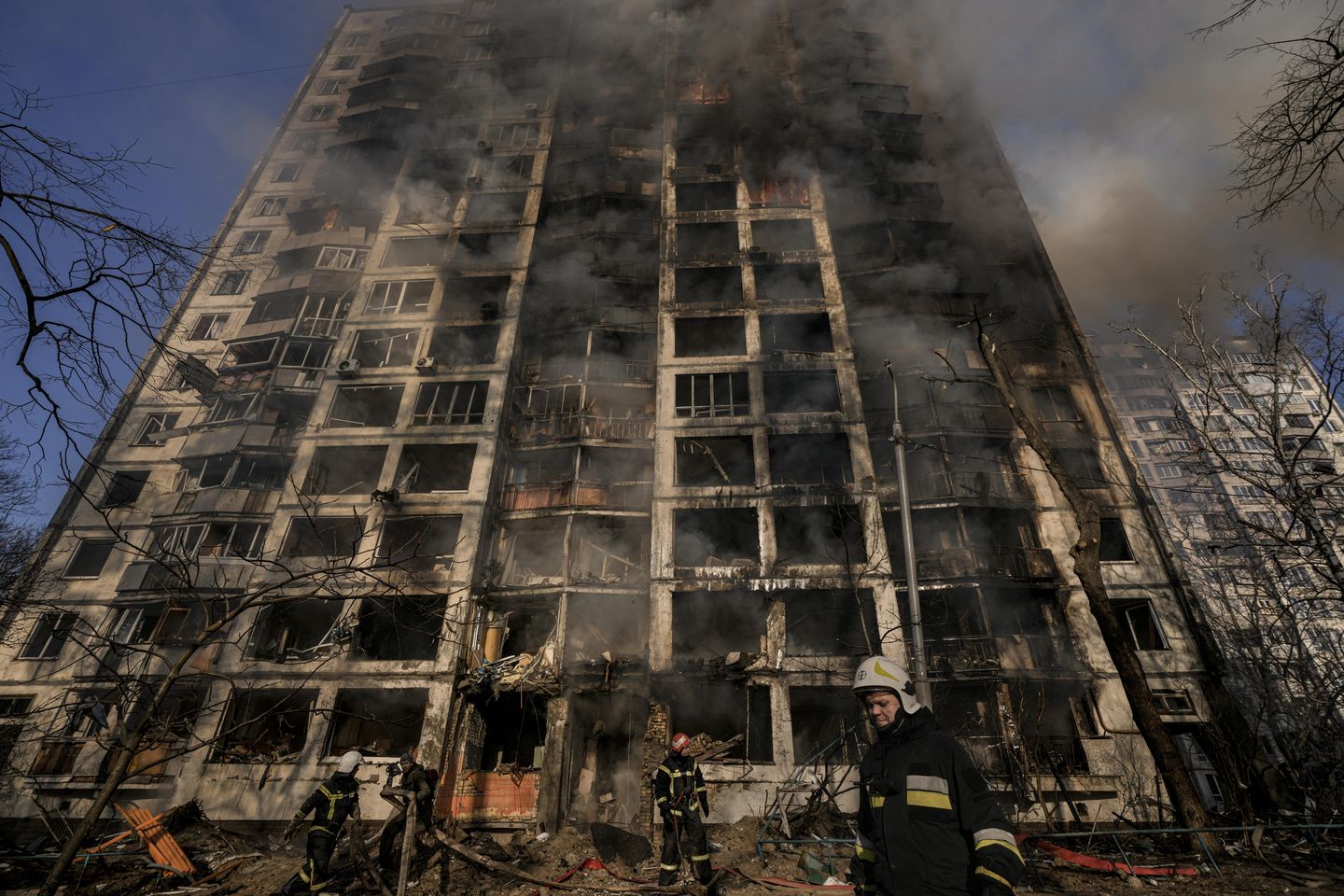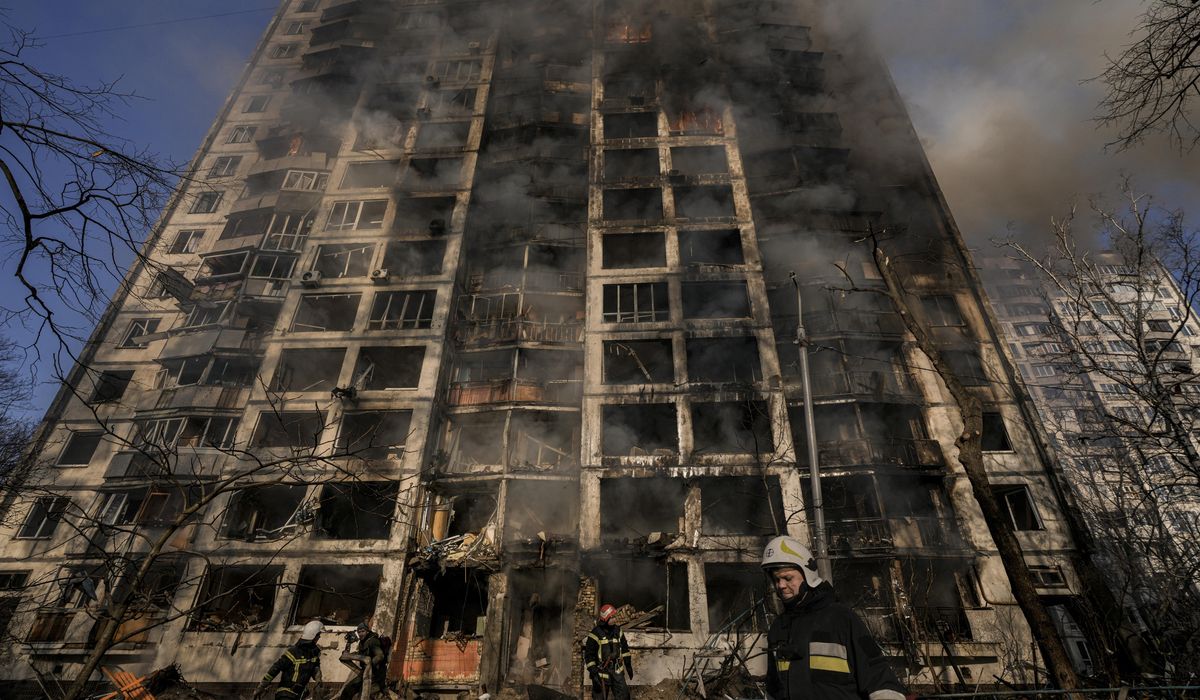

President Biden is set to travel to Europe next week to huddle with top U.S. allies over their ongoing response to Russia’s invasion of Ukraine, the White House said Tuesday in an announcement that came as Russian forces intensified their bombardment of Ukrainian cities and the leaders of three NATO nations made a perilous visit to Kyiv.
The prime ministers of Poland, the Czech Republic and Slovenia traveled by train to the besieged Ukrainian capital to show their solidarity with Ukrainian President Volodymyr Zelenskyy just hours after a wave of intense, pre-dawn shelling by Russian forces rocked the city as the invasion entered its 20th day.
U.S. military officials say the dynamic of the conflict has changed little in recent days, with Russia able to shell both military and civilian targets at will but its ground forces able to make only minor advances against an unexpectedly tough Ukrainian resistance. That resistance has garnered Ukraine growing international support and put pressure on Mr. Biden and other Western leaders to do more to help Kyiv defend itself.
“It is here, in war-torn Kyiv, that history is being made. It is here that freedom fights against the world of tyranny. It is here that the future of us all hangs in the balance,” Polish Prime Minister Mateusz Morawiecki said on Twitter in a sobering message that came as signs continued to point to a worsening conflict. The Eastern Europeans were the first NATO leaders to travel to the Ukrainian capital since Russian President Vladimir Putin ordered the invasion to begin Feb. 24.
Russian and Ukrainian officials held another round of direct talks on Tuesday, but no progress toward a major cease-fire was announced, with Russia’s foreign minister saying Ukraine must “demilitarize” and Russian military forces edging ever closer to the outskirts of Kyiv.
Fighting had briefly paused around a humanitarian corridor in the southern Ukrainian city of Mariupol, where civilians in 2,000 cars successfully fled Tuesday in what was believed to be the biggest evacuation yet from the besieged seaport, where officials have said more than 2,300 people have died.
New efforts to bring civilians to safety and deliver aid were underway around Ukraine, with the Red Cross saying it was working to evacuate people from the northeastern town of Sumy near the Russian border in about 70 buses.
But in the country’s east, Russian forces launched more than 60 strikes overnight on Ukraine’s second-largest city, Kharkiv, according to regional administration chief Oleh Sinehubov. The strikes hit the city’s historical center, including the main marketplace.
Nearly 700 civilians in Ukraine have been confirmed killed, with the true figure probably much higher, according to United Nations officials. The number of Ukrainian refugees flooding into Poland and other neighboring states is nearing 3 million.
The Ukrainian leader, who will deliver a virtual address to a joint session of Congress Wednesday, again appealed to the U.S. and its NATO allies for greater help, including a “no-fly zone” over Ukrainian airspace that the Biden administration and NATO leaders have rejected as too provocative to Russia.
“How many more cruise missiles need to fall on our cities?” Mr. Zelenskyy asked in an impassioned televised address to Canada’s parliament Tuesday, noting that 97 children have been killed. While expressing gratitude for Canadian and Western support so far, Mr. Zelenskyy added, “Unfortunately this did not bring an end to the war. Kharkiv [and] Mariupol are not protected like your cities are protected.”
But Mr. Zelenskyy, in separate reported comments to the leaders of the British Joint Expeditionary Force Tuesday, appeared to concede one point the Kremlin has been insisting upon — that Ukraine will never join the NATO military alliance. Ukrainian officials had previously conceded that NATO membership was many years down the line, but had refused to rule it out altogether.
“We have heard for years that the doors were open, but we also heard that we could not join. It’s a truth and it must be recognized,” he said in a video clip, according to Ukrainian news outlet Trukha. “Our people understand this, and we are beginning to count on our own strength.”
Capital in peril
Ukrainian officials said that the situation around Kyiv was growing increasingly dire. Russian artillery barrages, they said, had slammed into four multi-story buildings in the capital and killed dozens of people. The shelling ignited a huge fire in a 15-story apartment building and spurred a frantic rescue effort.
Shockwaves from one explosion damaged the entry to a downtown subway station that has been used as a bomb shelter. City authorities tweeted an image of the blown-out facade and said trains would no longer stop at the station.
The Associated Press reported that other strikes had targeted a western district of Kyiv, disrupting a relative calm that returned after an initial advance by Moscow’s forces was stopped in the early days of the war.
Two more journalists, both employed by Fox News, were killed Tuesday. Irish cameraman Pierre Zakrzewski and Ukrainian producer Oleksandra Kuvshynova died in an attack that left Fox reporter Benjamin Hall seriously wounded. The deaths came two days after American documentary filmmaker Brent Renaud, in Ukraine on assignment for Time’s film unit, was killed in Irpin.
Western European military officials warned Tuesday that Mr. Putin may be moving toward a strategy of staging bogus “referendum” votes to install puppet mayors in several Ukrainian cities.
Russia may stage such a “referendum” in the Ukrainian city of Kherson to legitimize it as a “breakaway republic,” according to an intelligence assessment published by Britain’s Ministry of Defense. Such a move would represent an effort by Moscow to give Kherson similar status as Donetsk, Luhansk and Crimea — Ukrainian territories that Russia previously annexed or took effective control of via proxy forces in 2014.
British officials noted there were protests in Kherson Monday, with Russian forces firing warning shots in an attempt to disperse them. There were also public demonstrations in the Russian-occupied cities of Melitopol and Berdyansk.
Russia installed its own mayor in Melitopol after the abduction of its real mayor on Friday. Authorities said the mayor of Dniprorudne reportedly has been abducted, too. “Russia is likely to make further attempts to subvert Ukrainian democracy as it attempts to consolidate political control of Ukraine,” the assessment circulated Tuesday by British officials warned.
The warning came as anxiety mounted among leaders across Western Europe over the prospect of a spiraling conflict with Russia.
Mr. Morawiecki, the Polish prime minister, posted photos of himself and his Czech and Slovenian counterparts studying a map of Ukraine in the wood-paneled room of a building in an undisclosed location of Kyiv.
The leaders said they made the trip to show solidarity in the face of Russia’s invasion. While the European Union officials said it was not sanctioned by other members of the 27-nation bloc, Czech Prime Minister Petr Fiala tweeted that the “aim of the visit is to express the European Union’s unequivocal support for Ukraine and its freedom and independence.”
U.S. Defense Department officials say that Russia’s vaunted military continues to underperform in the fighting, unable to overcome stiff Ukrainian resistance and the Kremlin’s own miscalculations over how the war would go.
A 40-mile long Russian resupply convoy heading toward Kyiv has had no success in reaching Ukraine’s capital city, a senior Pentagon official told reporters in Washington in a background briefing. “It is still stuck,” the official said. A senior Ukrainian official told reporters that he expects the Russian offensive to bog down and pull out within weeks owing to the inability to bring in fresh supplies or trained troops.
“Russian forces are still on the outside of Kharkiv where, as before, they face stiff Ukrainian resistance,” the official added. “Chernihiv remains isolated, but we still assess that Ukrainians are working to keep a line of communication open.”
Extraordinary summit
U.S. officials said Mr. Biden will hold “face-to-face” meetings with several European counterparts next week while attending an extraordinary NATO summit in Brussels on March 24. The president also will attend a scheduled European Council summit, where officials say discussions are already underway toward increasing sanctions on Russia and expanding the European Union’s humanitarian response to the invasion.
Mr. Biden’s “goal is to meet in person face-to-face with his European counterparts and talk about, assess where we are at this point in the conflict in the invasion of Ukraine by Russia. We’ve been incredibly aligned to date,” said White House spokeswoman Jen Psaki. “That doesn’t happen by accident. The president is a big believer in face-to-face diplomacy. So it’s an opportunity to do exactly that.”
Mr. Biden signed a bill Tuesday that will provide $13.6 billion in new military and humanitarian aid to Ukraine as part of $1.5 trillion in federal spending that will fund the government through September.
The administration also announced a fresh slate of economic sanctions targeting Belarus President Alexander Lukashenko, his wife Halina, and 11 Russian officials — including deputy Russian defense ministers and a judge — accusing them of “gross human rights abuses.”
The sanctions announced by the Treasury Department expand upon previous actions against Mr. Lukashenko, who allowed Russian troops into his country as they prepared the attack on Kyiv. Russia is also launching missiles from Belarusian territory, treating wounded soldiers in Belarusian hospitals and using Belarusian morgues to store those killed in fighting.
The State Department separately announced new visa restrictions on 38 current and former Russian government officials suspected of suppressing dissent in Russia.
Despite the increased diplomatic and sanctions pressure, there are growing signs of division among Democrats and Republicans over how Washington should respond to the Ukraine crisis.
U.S. lawmakers are likely to put on a show of unity Wednesday, when Mr. Zelenskyy is scheduled to address them via videoconference.
But GOP critics of Mr. Biden have grown increasingly vocal during recent days with their frustration over what they claim is an unwillingness on the part of the administration to confront Mr. Putin.
Sen. Tom Cotton, Arkansas Republican, slammed Mr. Biden in an op-ed published Tuesday by Fox News, saying the president is responding with “timidity and half measures” to Mr. Putin’s aggressive military actions.
The criticism marks a shift among some Republicans who had spent the initial days of the invasion projecting unity and directing their sharpest attacks at Mr. Putin, not Mr. Biden.
Mr. Cotton’s column took particular issue with the administration’s nixing last week of Poland’s offer to send fighter jets to Ukraine through a U.S. air base in Germany.
The Pentagon argued the move could spark a direct confrontation between NATO and Russia, something Mr. Biden has consistently ruled out.
Mr. Cotton argued the president bowed in the face of “hollow threats” from Moscow.
“Biden’s fighter fiasco is only the latest example of his timidity in the face of Russian aggression,” he wrote. “At every step, Joe Biden has allowed America’s response to be dictated from Moscow out of a fanciful fear of provocation. The wages of Biden’s weakness are Russian tanks rolling through Eastern Europe.”
The White House in recent days has become increasingly defensive about its response to Russia. Ms. Psaki insisted on Monday that Mr. Biden has forcefully countered Russian aggression without drawing the U.S. into a third world war.
“I would say at this moment in time, we have hardly been sitting on the sidelines,” she said. “We have been leading this effort around the world to respond to every step and every escalatory step that President Putin and the Russians are taking.”
• Mike Glenn contributed to this article, which is based in part on wire service reports.
